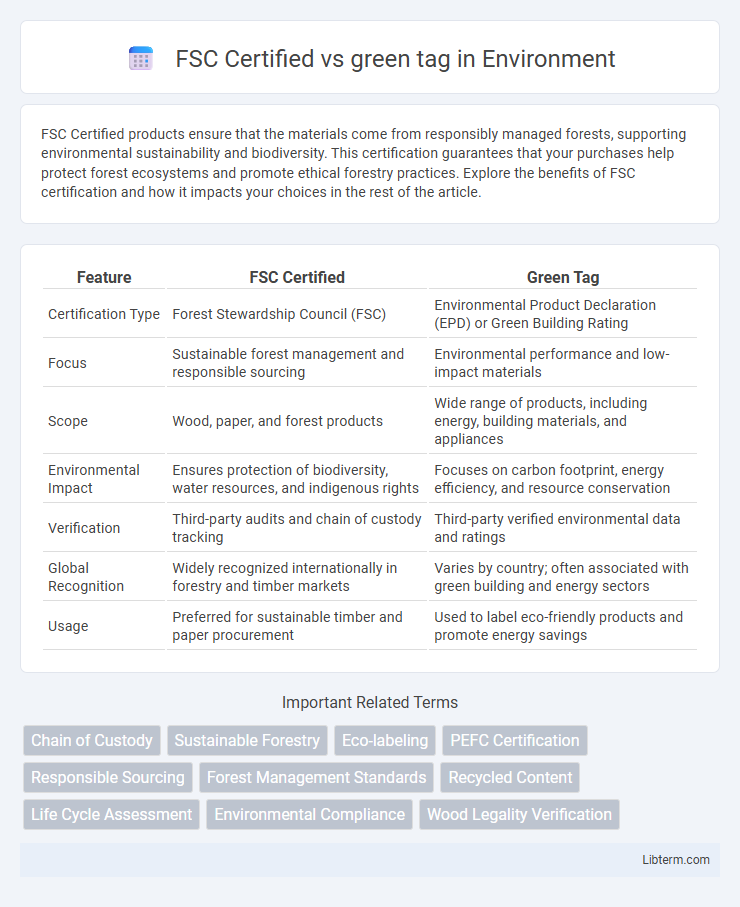FSC Certified products ensure that the materials come from responsibly managed forests, supporting environmental sustainability and biodiversity. This certification guarantees that your purchases help protect forest ecosystems and promote ethical forestry practices. Explore the benefits of FSC certification and how it impacts your choices in the rest of the article.
Table of Comparison
| Feature | FSC Certified | Green Tag |
|---|---|---|
| Certification Type | Forest Stewardship Council (FSC) | Environmental Product Declaration (EPD) or Green Building Rating |
| Focus | Sustainable forest management and responsible sourcing | Environmental performance and low-impact materials |
| Scope | Wood, paper, and forest products | Wide range of products, including energy, building materials, and appliances |
| Environmental Impact | Ensures protection of biodiversity, water resources, and indigenous rights | Focuses on carbon footprint, energy efficiency, and resource conservation |
| Verification | Third-party audits and chain of custody tracking | Third-party verified environmental data and ratings |
| Global Recognition | Widely recognized internationally in forestry and timber markets | Varies by country; often associated with green building and energy sectors |
| Usage | Preferred for sustainable timber and paper procurement | Used to label eco-friendly products and promote energy savings |
Introduction to FSC Certification and Green Tag Labels
FSC Certification ensures that forest products come from responsibly managed forests meeting strict environmental, social, and economic standards verified by the Forest Stewardship Council. Green Tag labels, often used in sustainable building and product markets, indicate compliance with various eco-friendly criteria but may vary in certification rigor and scope. Understanding the distinction between FSC's globally recognized forestry certification and broader green tag labels helps consumers make informed choices in sustainability.
Understanding FSC Certified: Definition and Standards
FSC Certified refers to products sourced from forests managed according to the Forest Stewardship Council's rigorous environmental, social, and economic standards ensuring sustainable forestry practices. These standards include criteria for maintaining biodiversity, protecting indigenous rights, and promoting responsible harvesting to prevent deforestation. The FSC label guarantees transparency and traceability in the supply chain, distinguishing it from generic green tags that may lack third-party verification and comprehensive sustainability criteria.
What Is the Green Tag? Overview and Criteria
The Green Tag is an environmental certification awarded to products that meet strict sustainability and eco-friendly criteria, emphasizing reduced carbon footprints and renewable resource use. Unlike FSC Certified, which focuses specifically on sustainable forest management, the Green Tag assesses broader environmental attributes such as energy efficiency, waste reduction, and recyclability. Products with a Green Tag ensure compliance with rigorous ecological standards, promoting greener production and consumer choices.
Key Differences Between FSC Certification and Green Tag
FSC Certification ensures responsible forest management by verifying that wood products come from sustainably managed forests meeting strict environmental, social, and economic standards. Green Tag, often used for energy or resource efficiency, primarily indicates environmentally friendly attributes but lacks the comprehensive supply chain accountability and third-party auditing inherent in FSC Certification. The key difference lies in FSC's rigorous certification process guaranteeing forest sustainability, whereas Green Tag offers broader, less specific environmental endorsements.
Environmental Impact: FSC vs. Green Tag
FSC Certified products ensure sustainable forest management by meeting strict environmental, social, and economic standards, promoting biodiversity and reducing deforestation. Green Tag certification focuses on broader sustainability metrics, including energy efficiency and reduced carbon emissions across various industries, not limited to forestry. Comparing environmental impact, FSC directly addresses responsible forestry practices, while Green Tag reflects overall ecological performance in materials and operations.
Certification Processes: FSC vs. Green Tag Comparison
FSC certification requires adherence to strict environmental, social, and economic standards verified through independent audits, ensuring sustainable forest management and traceability from forest to final product. Green Tag certification primarily assesses the environmental performance of building products based on life cycle analysis, focusing on sustainability metrics such as embodied carbon and energy efficiency, with validation from accredited third-party organizations. While FSC emphasizes responsible forestry practices, Green Tag targets broader product-level environmental impacts, making their certification processes distinct yet complementary in promoting sustainability.
Market Recognition and Trust: FSC Certified vs. Green Tag
FSC Certified products command stronger market recognition due to the Forest Stewardship Council's globally established reputation for sustainable forestry practices, fostering higher consumer trust. Green Tag certifications, while meaningful, tend to have more regional influence and less universal recognition, impacting their market penetration. Brands leveraging FSC certification often benefit from enhanced credibility and preference among environmentally conscious consumers and international markets.
Sustainability Benefits: FSC and Green Tag Compared
FSC Certified products ensure sustainable forestry by verifying responsible forest management practices that protect biodiversity, prevent deforestation, and support local communities. Green Tag certification emphasizes renewable energy usage and reduced carbon footprints, promoting environmentally friendly manufacturing and operational processes. Both certifications contribute to sustainability by addressing different environmental impacts--FSC targets sustainable resource extraction while Green Tag supports clean energy and emissions reduction.
Choosing Between FSC Certified and Green Tag Products
Choosing between FSC Certified and Green Tag products requires understanding their certification standards and environmental impact claims. FSC Certified items guarantee responsible forest management verified by the Forest Stewardship Council, ensuring sustainability and biodiversity protection. Green Tag products, often evaluated through local or regional eco-labels, emphasize broader environmental attributes but may lack the rigorous, global oversight FSC certifications provide.
Conclusion: Which Certification Best Supports Sustainable Practices?
FSC Certified status directly ensures responsible forest management by meeting strict environmental, social, and economic standards, making it a robust indicator of sustainable forestry practices. Green tag certifications often focus on broader environmental impacts but may lack the specificity and rigorous auditing processes found in FSC certification. Choosing FSC Certified products provides stronger support for sustainable forestry and conservation efforts due to its comprehensive criteria and global recognition.
FSC Certified Infographic

 libterm.com
libterm.com